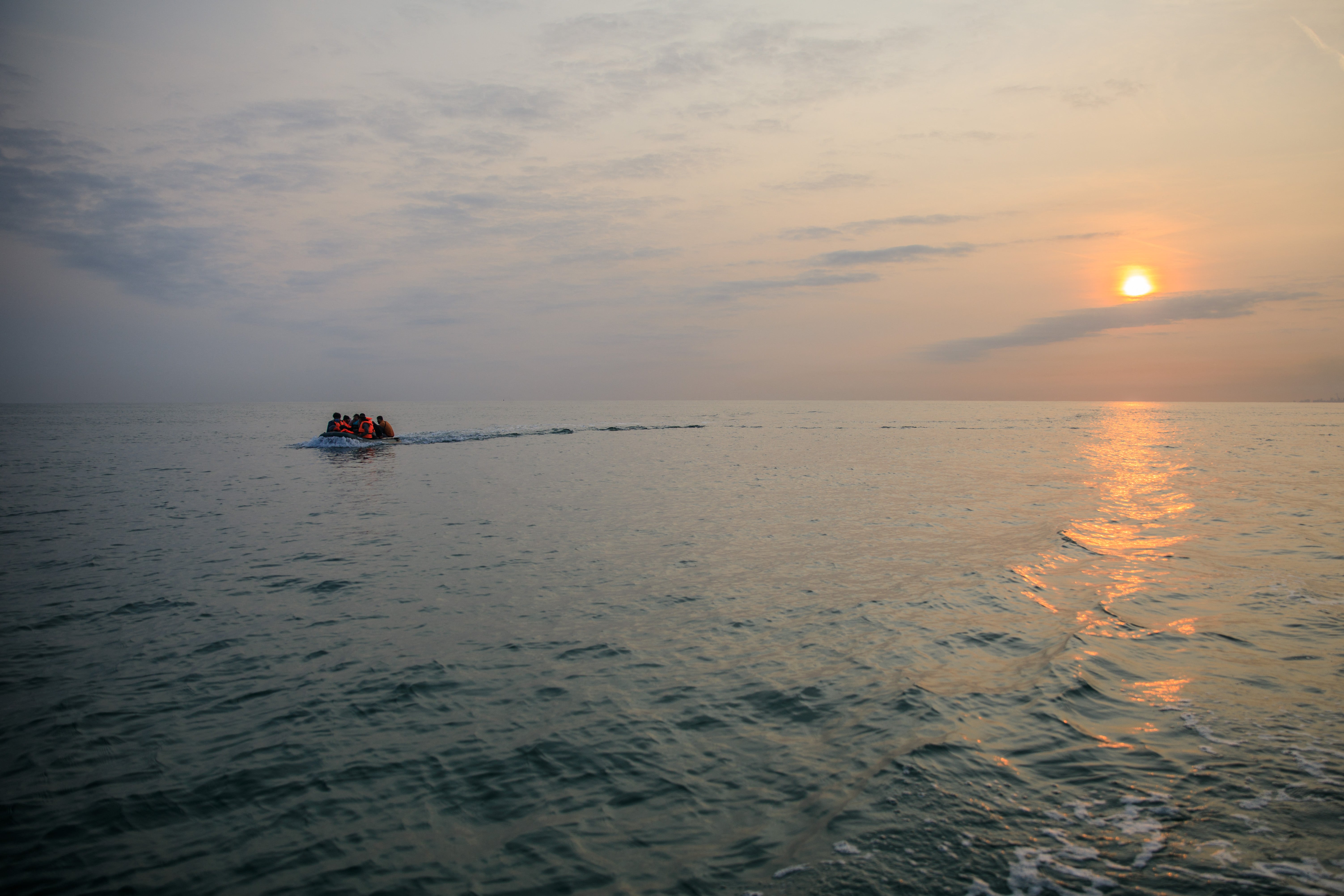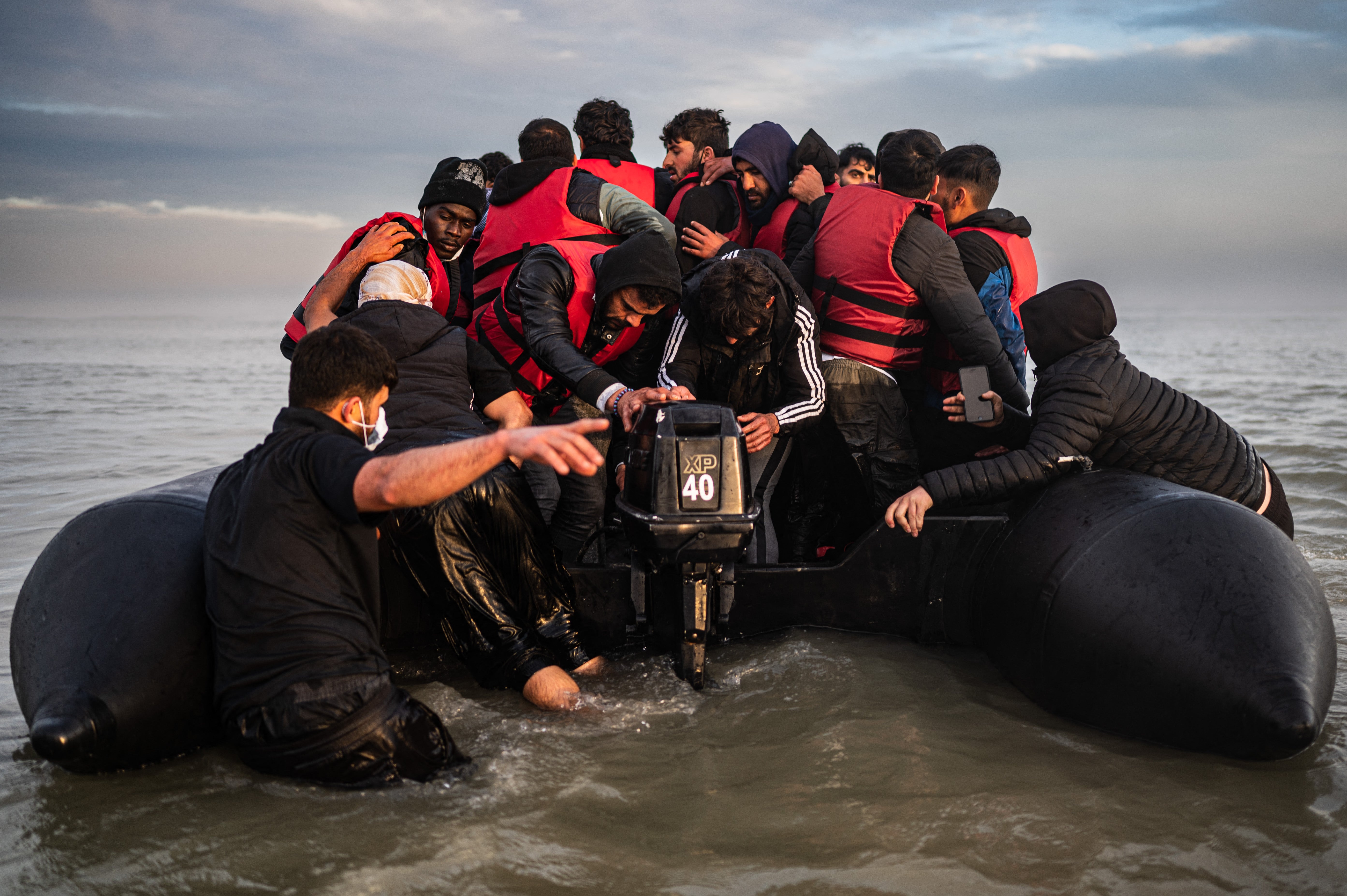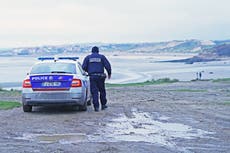British rescuers tried to find sinking small boat after migrants called for help, investigation finds
Interim report says ‘some of the events relating to this loss of life had occurred inside UK waters’

British rescuers responded to calls for help from migrants on a sinking dinghy in the English Channel but could not find them, an investigation has found.
An interim report released on the anniversary of the worst disaster of its kind, which left at least 27 victims dead, said air and sea searches were carried out.
The Marine Accident Investigation Branch said 34 people left a beach near Dunkirk on a small inflatable boat on the evening of 23 November 2021.
“During the passage, the migrants got into difficulties and entered the sea,” its report added.
“Some of those on board the boat made phone calls to alert Maritime Rescue Coordination Centres (MRCC) ashore about their situation.
“Staff at the Dover MRCC responded to the calls for help and dispatched UK surface and air assets to search the area where the distressed migrants were assessed to be. However, nothing was found.”
At 1pm on 24 November 2021, a French fishing crew reported bodies in the water around 9 miles off the coast of Calais.
Two survivors and 27 bodies were recovered from the sea and taken to France, while the remaining five passengers were unaccounted for.
MAIB said its investigation was ongoing and was expected to be published in summer 2023.
A separate judicial inquiry in France has heard that French authorities told drowning migrants they were in British waters and to call 999.
Call logs have shown that dinghy passengers made multiple calls for help for over two hours, but when a survivor begging for help told French authorities people were in the sea, they replied: “Yes, but you are in English waters.”
The interim MAIB report said the authority did not initially take any action on the disaster because it was “assessed to fall outside its jurisdiction” in French waters, but it later “became evident that some of the events relating to this loss of life had occurred inside UK waters”.
Relatives of the drowned victims say they have not yet been contacted by the UK probe, and have vowed to fight for justice for their loved ones.
Vigils were to be held in Dunkirk, Folkestone and outside parliament in London on Thursday evening.

A spokesperson for the MAIB said: “This was a dreadful accident in which many people lost their lives. On the anniversary of the accident our thoughts are with those who lost loved ones in this tragedy.
“While it may not be possible to fully understand precisely what happened at the time of the accident, it is important that we examine whether the UK’s emergency response was appropriate that night once it became apparent that migrant boats might be in distress in UK waters.
“The purpose of our investigation is to improve safety and if lessons can be learned, and if deemed appropriate, we will make recommendations to address the issues identified.”
The government has been accused of “putting more lives at risk” in the English Channel by focusing on unevidenced policies claimed to deter crossings rather than providing alternatives.
Appearing before parliament’s Home Affairs Committee on Wednesday, Suella Braverman offered her “condolences and thoughts” to the victims’ loved ones, but said they had taken a “lethal, dangerous journey”.
“It is a tragedy on a scale that is unacceptable,” she added. “I am very sorry and saddened that happened and any loss of life in this instance is of great sadness.”
Conservative MP Tim Loughton confronted the home secretary about a “shortage of safe and legal routes” for asylum seekers.
Ms Braverman struggled to reply when he asked what options, other than a small boat crossing, would be open to a 16-year-old boy fleeing war in Africa and trying to join relatives in the UK.

Charities accused ministers of “refusing to accept reality” by attempting to deter crossings with the Rwanda scheme and new laws, rather than creating alternatives.
Tim Naor Hilton, chief executive of Refugee Action, said the situation was “putting more lives at risk”, and called the November 2021 sinking an “avoidable tragedy borne out of a hostile government policy that prioritises keeping people out over keeping people safe”.
Clare Moseley, founder of the Care4Calais charity, accused authorities of “callousness and apathy”, adding: “The families need answers now and we must know what lessons should be learned from this tragedy before more people die.”
Under British law, people must be physically present in the country to claim asylum but there is no visa for reaching the UK for that purpose.
Official figures show that 90 per cent of people making small boat crossings in the year to September claimed asylum.
The government was warned three years ago that small-boat crossings were rising because efforts to secure French ferry and lorry ports would drive migrants “to take more dangerous routes and push them into the hands of criminal groups”.
A November 2019 parliamentary report added: “In the absence of robust and accessible legal routes for seeking asylum in the UK, those with a claim are left with little choice but to make dangerous journeys by land and sea.”
Join our commenting forum
Join thought-provoking conversations, follow other Independent readers and see their replies
Comments


Bookmark popover
Removed from bookmarks